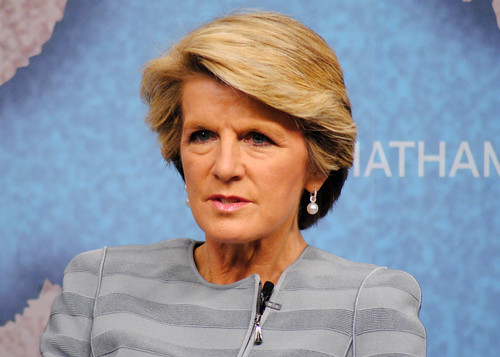Former Liberal Foreign Minister Julie Bishop says voting No in the Voice referendum will damage Australia’s international reputation
Julie Bishop #JulieBishop

Former foreign minister Julie Bishop says Australia’s international reputation will be damaged if the Voice to Parliament referendum fails to pass.
The former deputy leader of the Liberal Party joined current Foreign Minister Penny Wong and Yes23 campaign director Dean Parkin in Perth on Monday to help boost support for the Voice in Western Australia – where just 44 per cent of voters back the constitutional change.
Echoing previous comments from Prime Minister Anthony Albanese, Ms Bishop warned that voting No would send a “very negative message” about Australia’s “openness and empathy”.
“I know that Australia’s international reputation can be affected by a No vote,” she said.
“I have no doubt that it will be sending a very negative message about the openness and the empathy and the respect and responsibility that the Australian people have for Aboriginal and Torres Strait Islanders.”
Ms Bishop was Deputy leader of the Liberal Party from 2007 to 2018, serving as foreign minister under Tony Abbott and Malcolm Turnbull.
Standing alongside Labor’s current foreign minister, the ex-Liberal MP said it was “probably more difficult” for Penny Wong to say this because “she’s out there on the international stage having to promote Australia’s current position,” but that she is would be “most concerned at the message this would send the rest of the world if we can’t find it in our hearts to say yes.”
When asked whether she agreed with Ms Bishop’s assessment, Senator Wong said: “Julie, as always, is very eloquent and I’m going to leave it at that.”
Ms Bishop’s comments echo claims Prime Minister Anthony Albanese made earlier this year.
In January the Prime Minister told Sydney’s 2GB radio that a No vote “would send a bad message re reconciliation and it would also send a bad message in the way Australia is perceived internationally.”
Then in Question Time a month later, the Labor leader asked the opposition to think about the consequences of not supporting the Voice.
“I ask you to think about… how Indigenous Australians will feel if it’s not successful. How Australians will feel, and how Australia is perceived internationally.”
The Prime Minister’s comments were slammed as “emotional blackmail” by Senator Jacinta Price, who has since been promoted to shadow minister for Indigenous Australians.
“I’ve spoken to a number of ambassadors from various other countries and particularly European countries, who are actually deeply concerned given the world’s history, that this Prime Minister would be looking to divide us along the lines of race,” Ms Price said.
“There are actually countries looking on going what is this prime minister up to, why is he doing this, has he not learned from world history?
Senator Price also said it was “a little bit insulting for a lot of Indigenous Australians to suggest that somehow we are going to be broadly upset if it’s not successful.”
“The truth is the Aboriginal people that I’ve spoken to and there are many of them, would be quite happy not to have this overarching extra gatekeep on top of all other bureaucracies that currently exist,” she said.
This isn’t the first time Ms Bishop has spoken about her support for the Voice to Parliament.
In an address to the National Press Club in July, Ms Bishop said the voice was a “step in the right direction” and that Australian’s “have got to give it a chance”.
“I sat through too many of those Closing the Gap speeches in parliament to sense that what we were doing was working to close the disparity and inequality between Indigenous and non-Indigenous populations,” she said.
“In some instances, the key measures were getting worse, not better, so it’s not a question of money, it’s not a question of politicians coming up with policies – it’s a question of giving Indigenous people the franchise to make decisions to implement policies that will work.”
On Monday she added that the Voice was “an opportunity first to give Aboriginal Torres Strait Islanders their rightful place in the Constitution”.
“[It will] give them the right and the risk and the responsibility to come up with policies that will address the problems as they see them and get better outcomes, and I truly believe that this is our opportunity,” the former foreign minister said.